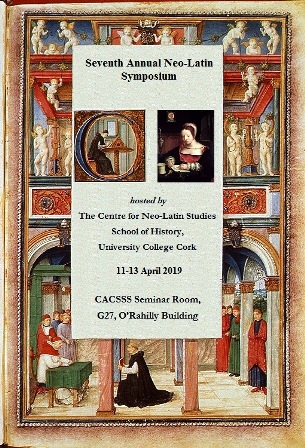
Neo-Latin Symposium 2019
The Seventh Annual Cork/Lexington Neo-Latin Symposium will take place 11-13 April, 2019 in Cork, Ireland, hosted by the Centre for Neo-Latin Studies, University College Cork.
The Neo-Latin Symposium is devoted to the presentation of scholarly research in the area of Renaissance and Post-Renaissance Latin Studies. The Symposium was established in 2013 by Professor Jennifer Tunberg at the University of Kentucky, Lexington, under the auspices of the Kentucky Foreign Language Conference (KFLC). Since 2017 it has been held in Lexington and Cork in alternate years as part of a continuing collaboration between University College Cork and the University of Kentucky (Lexington).
Conference Programme:
Thursday, 11th April
10-11 Registration and Welcome
11.00-12.30 Panel 1: Poetry in Context
Sara Hale (University of Manchester/British Library) Anglo-Italian Relations in Vincenzo da Filicaia’s Mogarineides
Sharon Van Dijk (University College London) Recontextualising Fletcher’s Verse in the 1650s
Christian Guerra (University of Basel) Satire as a Mirror: Johannes Atrocianus’ Neo- Latin Satires
2-3.30 Panel 2: Latinity
Jason Harris (University College Cork) Erasmus and Cicero in Richard Stanihurst’s De rebus in Hibernia gestis
Violeta Moretti and Ana Mihaljević (Juraj Dobrila University, Croatia) Vernacular Influences on Neo-Latin of the East Adriatic Coast
Guglielmo Monetti (Università degli Studi di Padova, DISSGEA) ‘Utinam scires latine, clarissime vir!’ Christian Adolph Klotz, Reviewer of d’Alembert’s Sur l’harmonie des langues, et sur la latinité des modernes
3.30-4 Coffee
4-5 Panel 3: Classical Reception
Camilla Tosi (Università degli Studi di Ferrara) Plautus and the Ancient Roman Law in the Studies of the Humanists
Olivia Montepaone (International Society for the Study of Medieval Latin Culture, Florence) Classics, Antiquarianism and Theology: Collecting Fragments of the Caesars in Eighteenth-Century Germany
Friday, 12th April
10-11.30 Panel 4: Pedagogical Texts
Laura Manning (University of Kentucky) Teaching Active Latin: Johannis Posselii De Ratione Discendae ac Docendae Linguae Latinae
Anita Martins (University of Rennes 2/ University of Coimbra) Collectanea Moralis Philosophiae (1571): let’s talk about corpus and corpora
Renate Berga (Special Collections Department, National Library of Latvia) Deconstructing the Early Modern Dissertations of 17th Century Riga Academic Gymnasium: Text and Paratext
11.30-12.30 Guided Tour of UCC Campus in Latin
2-3.30 Panel 5: Interpreting Narratives
Adir Fonseca Jr (Wolfson College, University of Oxford) Of sheep and men: Boccaccio, allegory and the bucolic genre
Jennifer Tunberg (University of Kentucky) Performing the Patrimony and the Power of Words in Barclay’s Argenis (1621)
Jennifer Nelson (The Robbins Collection, University of California, Berkeley, School of Law, and the University of Florida) Gian Vittorio Rossi’s Eudemia: A Who’s Who (and Where’s Where) of Roman Literary Society under Pope Urban VIII
3.30-4 Coffee
4-5.30 Panel 6: Representing Nature
Peter Dennistoun Bryant (Conventicula Lexintoniensia) Rhodologia Rapiniana: Rhodanthe, Queen of Corinth, the Rose, and the Feminisation of Floral Myths in the ‘Hortorum Libri IV’ (1665) of Renatus Rapinus
Dominik Berrens (University of Innsbruck, Austria) Naming an Unknown Species – The Case of the Sloth
Angela Helmer (University of South Dakota) Theobroma cacao – A nineteenth century medical thesis of Peru
6.45pm Conference Dinner
Saturday, 13th April
10-11.30 Panel 7: Philosophical Texts
Matthew Gorey (University of Puget Sound) The Poetics of Infinity in Giordano Bruno’s De immenso
Bartholomew Begley (University College Cork) Authority and freethinking in the work of Jakob Thomasius, Spinoza’s earliest critic
Juliane Küppers (Humboldt-Universität zu Berlin and Freie Universität Berlin) Fighting About All and Nothing with Lucretius – The Anti-Lucretian didactic poem as a medium of contemporary scientific debate in the early 18th century
12-3 Excursion to Blarney Castle and Lunch

